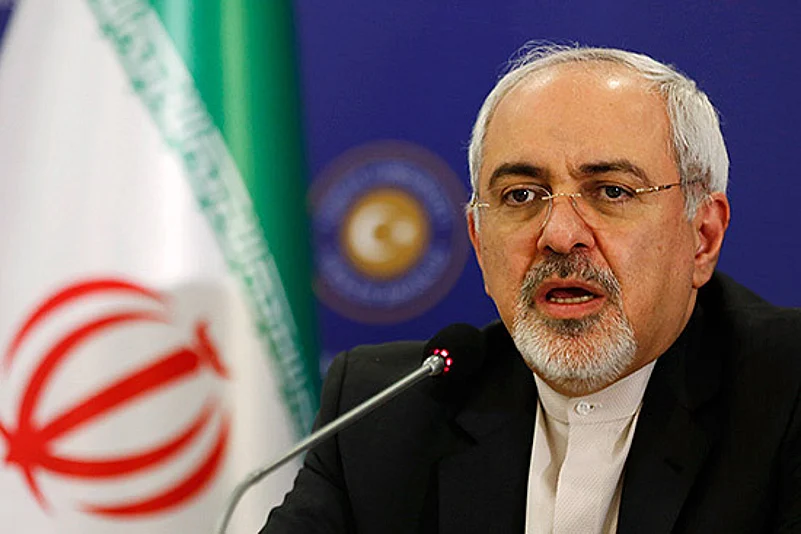Days before Prime Minister Narendra Modi is scheduled to embark on his first sojourn to the Arab world with a visit to United Arab Emirates (UAE), the Iranian foreign minister Jawad Zarif arrives in Delhi to hold wide-ranging consultation with the Indian leadership on strengthening bilateral ties and also to brief India on important developments in West Asia.
This will be Zarif’s first visit to India after the successful signing of the nuclear deal between Iran and the West. The Iranian foreign minister was the chief negotiator from Tehran for the P-5 plus one nuclear negotiation, which was finally signed by the two sides in Vienna on July 14 this year. Officials of the Iran Embassy in Delhi said, “Indo-Iranian ties as well as the current developments in the region would be high on the agenda.”
Advertisement
UAE is part of the Gulf coalition army which is engaged in an ongoing war in Yemen against the Houthi rebels, who are allegedly being backed by the Iranians.Though Iran denies any direct involvement in the Yemen conflict where Saudi-led Gulf coalition armed forces are engaged in a war to restore ousted ruler, Abd Rabbi Mansour Hadi, currently exiled in Riyadh, it has already launched a huge media campaign against the Sauids and its allies for their role in Yemen.
During his talks with the UAE leadership, PM Modi is likely to be briefed on the ongoing war in Yemen, particularly the Iranian role in the conflict. By briefing the Indian leadership about Yemen, Zarif surely will get the chance of at least getting his side of the story in before the UAE leaders, who are an active participant in the Gulf coalition army in Yemen, can brief Modi on the conflict.
Advertisement
Zarif’s main meeting will be with his Indian counterpart, Sushma Swaraj but he will also meet transport minister Nitin Gadkari and other senior officials of the government during his stay in the capital.
India, along with China and Russia were among the countries that continued its engagement with Iran throughout the past three decades, especially when US-led western sanctions were imposed on Iran for its controversial nuclear programme. Though Tehran all along maintained that its nuclear programme was for peaceful purpose, the US and its western allies believed it was for making nuclear weapons. Prolonged negotiations between the two sides finally ended last month when a historic deal was signed in the Austrian capital.
But despite having backed Iran for most part of its international isolation, there were brief periods when India also came under the US influence and pressure to distance itself from Iran. Most notably this was done when in 2005-06 when India voted with the western country members at the IAEA board of governors’ meeting against Iran. Subsequently, it also reduced the quantity of oil it had been importing from Iran also under America’s nudging and at a time when the Obama administration had imposed “crippling” sanctions on Iran from 2012 onwards.
Zarif is likely to take the opportunity of his visit to thank the Indian leadership for its support to Iran during much of its tough phase. He will also look at areas where both sides could step up cooperation, particularly on Chabahar, where work had slowed down for some years. India also owes Tehran over $ eight billion as oil payment. Discussions may also take place between the two sides on how that payment is now to be made.
Advertisement
Skeptics in India feel that Delhi has already missed the Iranian bus by dragging its feet in the last few years, much of which stemmed from its growing closeness with the US. But Iranian officials in Tehran, while acknowledging such moments of hesitancy by India, do not miss the opportunity to highlight its support to Iran at the height of its isolation by the West.
But while the Iranian foreign minister will definitely brief the Indian leadership on the finer points of the nuke deal and the road ahead, one of his main focus will also be on fast-paced developments in West Asia. One such issue will be on the ongoing war in Yemen. The role of the Islamic State in Iraq and Syria, which has raised serious concerns in Asia as well as in the West, is yet another important area which is likely to be discussed between Zarif and the Indians.
Advertisement
Developments in Afghanistan, a country where India and Iran had worked together with Russia against the Taliban, is yet another key area of concern and interest to both countries. The Iranian foreign minister may suggest ways in which the two sides can work with each other to deal with the emerging scenario in Afghanistan.



















